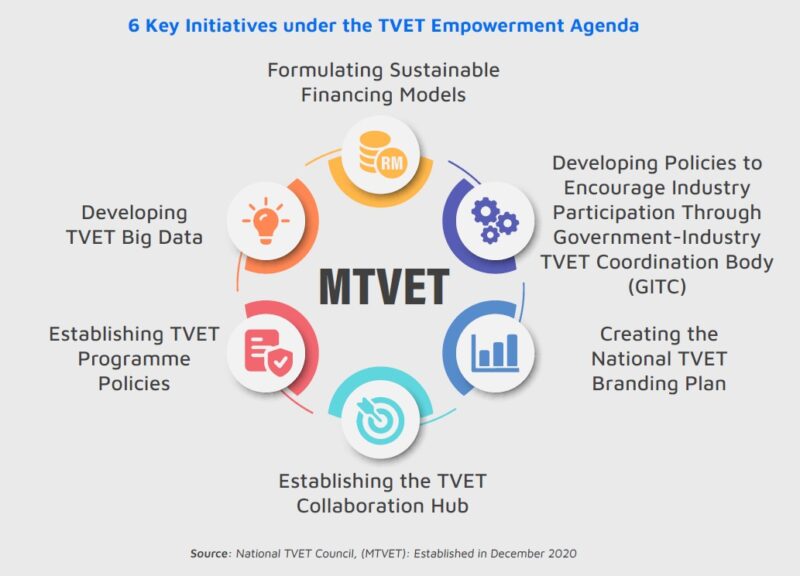
This site
is mobile
responsive

Education is a powerful driver of development, delivers large and consistent returns in terms of income, and is the most important factor to ensure equality of opportunity. In general, the education system in Malaysia is categorised into preschool, primary, secondary, post-secondary, and tertiary education.
Importance of private education
For post-secondary and tertiary education, the Government is focusing on international/private schools, Technical and Vocational Education Training (TVET) institutions and private higher education institutions (PHEI) as the sectors that can stimulate industrial and services development in Malaysia, thus ensuring a sustainable talent pipeline and contributing to the country towards becoming a regional education hub of excellence.
The private education sector has made significant contributions in all these sectors by complementing the Government’s efforts towards providing access to quality education. According to the Ministry of Education, private education contributed RM31.5 billion from tuition fees and living costs to the economy in 2018. This is projected to increase to RM65 billion by 2025 and RM84 billion by 2030, based on a growth rate of 5% to 6% annually.
With its high multiplier effects on the economy, private education has great growth potential for Malaysia to achieve its target of having the services sector contribute 70% of the Gross Domestic Product (GDP). In line with this aspiration, the Government has developed a strategic plan called “The Malaysian Higher Education Blueprint 2015- 2025 Higher Education” which focuses on the transformation of Malaysian higher-education institutions into world-class institutions, particularly TVET institutions.
Transforming TVET in Malaysia
Under the Vocational Education Transformation Plan introduced in 2012 and the Twelfth Malaysia Plan (12MP), the Government recognises TVET as part of the mainstream education in the country. For Malaysia to become a fully-industrialised developed country, more skilled and future-resilient TVET graduates are required to join the local workforce. In 2021, the Government allocated RM6 billion to support TVET.
To improve coordination within the Malaysian TVET ecosystem, the National TVET Council (MTVET) was established in December 2020. The council serves as a bridge to increase synergy between the Government and key industry players, as well as to elevate the image of TVET as a strategic career choice. Six key initiatives have been presented to set the direction of the TVET empowerment agenda:

Among these initiatives, the GITC stands out. For the first time, an industry-led body will be directly involved in the development of the country’s TVET human capital. This collaborative platform will steer the national TVET agenda, particularly in the areas of expertise, equipment and technology. Stakeholders involved are the centres of excellence and TVET institutes, regional economic authorities, and industries.
A total of 12 hubs were identified, including automotive, semiconductor, marine, aerospace, robotics, telecommunications, hospitality, and tourism. This initiative will be able to better produce graduates who fulfill the needs of the industry, improve the quality of TVET institutes, and ensure that the programmes offered are industry-oriented and relevant to the advancement of the industry.
With the TVET education transformation plan, the employability rate of Malaysian vocational college graduates has continued to increase from 97.6% in 2017 to 98.7% in 2019. Vocational colleges have become the largest provider of skilled workers in the country because of their strong emphasis on hands-on skills.
Promoting and nurturing the TVET ecosystem
In line with the Government’s aspiration to promote high-quality education, the Government through MIDA offers an Investment Tax Allowance of 100% of the qualifying capital expenditure incurred within a period of 10 years, and which can be offset against 70% of statutory income for each year of assessment. New and existing companies providing sciences, technical and vocational courses/training that undertake new investments, or upgrade their training equipment and/or expand their training capacity are eligible to apply for the incentive. As of 2021, MIDA has approved 31 projects with incentives amounting to RM1.9 billion in total investment since the incentive was introduced in 2013.
To date, there are more than 1,000 institutions that provide TVET education via public and private institutions. The Ministry of Education (MOE) has played an important role in nurturing local talents in TVET to meet global standards. Strategic partnerships have been forged with key local and international industry players such as Shell Bhd., Sime Darby Bhd., IBM Malaysia, Honda Malaysia, Beijing International Technology College, and ASEAN Chambers of Commerce to facilitate training programmes.
Among the private TVET institutions established in Malaysia are Penang Skills Development Centre (PSDC), Aviation Management College (AMC), TOC Automotive College, and Young Aces Technical College.
PSDC is an exemplary TVET institution. It is the first tripartite, industry-led skills training and education centre that has trained more than 247,000 participants through more than 12,000 courses over 33 years, with a student employability rate of 99%. In 2016, the centre executed its Industry 4.0 (IR4.0) initiative, with a strategy to support the new phase of the industrial revolution in Malaysia. This strategy has helped in sourcing local talent to match the demands of existing and new industries, especially in the northern area of Peninsular Malaysia. A key success factor for PSDC is its strategic collaborations with government agencies/institutions, local large companies and MNCs in Penang, and the industries from the neighbouring states of Penang.
TVET is the way forward
Malaysia is moving towards becoming a developed country. Both traditional academic and TVET pathways must be equally valued and cultivated to ensure sustainable talent development in the country. TVET, in particular, plays an important role in bridging the talent gap within the industrial sector.
The Department of Statistics (DOSM), Malaysia reported that for the second quarter of 2022, the number of jobs in the semi-skilled category remained dominant in the labour market (at 62.2%), followed by highly-skilled jobs (24.9%), and unskilled jobs (12.9%). For Malaysia to remain competitive, it needs to increase the number of highly-skilled workers to more than 45% by 2030.
Initiatives that enhanced local students to major in TVET and science, technology, engineering, and mathematics (STEM) courses continue to be highly enhanced, as the country seeks to produce skilled workers that are able to capitalise on the opportunities created by IR4.0.
